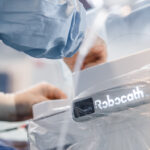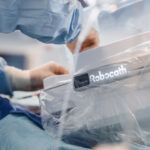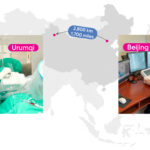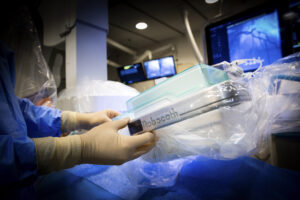Share this post:

Rouen and Rennes, France, October 19, 2023 — Robocath, a company that designs, develops and commercializes smart robotic solutions for the treatment of cardiovascular diseases, today announces the results of its ‘CARE’ clinical trial focusing on robotic carotid stenting[1]. This study is the first phase in an ambitious research program launched in July 2021 by Robocath and Rennes University Hospital in France. In the long term, it aims to enhance current and future generations of robots, with a view to improving the treatment of neurovascular diseases such as strokes, the second leading cause of death worldwide after Myocardial Infarction.
The aim of the ‘CARE’ trial – a prospective, single-arm, non-randomized clinical trial launched in November 2021 at Rennes University Hospital – was to assess the feasibility of robotic carotid stenting. During the trial, Dr. François Eugène and Dr. Quentin Alias performed seven robotic procedures using R‑One™, an innovative robotic platform developed and marketed by Robocath. This first-generation robot is designed to improve the treatment of cardiovascular disease by enhancing physicians’ hand gestures through increased precision, as well as drastically reducing medical staff’s exposure to X-rays. All procedures were performed without any medical complications, giving R-One a 100% clinical success rate. From a technical standpoint, only one of the procedures required a complete manual conversion.
“I am honored to have been part of this clinical trial, which marks an important first step on the road to making robotic procedures routine practice for the treatment of strokes. The success of these procedures is down to two key factors: accuracy and speed of patient care. Just like human hands, Robocath’s robot can move with millimeter precision and ensure the instruments remain in a fixed position for the entire duration of the procedure. Moreover, the technology opens up the possibility of long-distance treatment for stroke patients. Given these advantages, I believe that, in the years to come, robotic technology will be a driver of change in our patient care. Thanks to this technology, we can make treatment more effective and offset the unequal distribution of resources which currently leaves many stroke patients without access to a local treatment center. Robotics has the power to bring equal access to treatments to all patients across France and in other countries facing similar public health challenges,” said Dr. François Eugène, neurointerventionalist at Rennes University Hospital.
“In our line of work, precision is key to the success of each intervention. I am impressed by the pinpoint accuracy of the robot’s movements. The use of robotics could become, in time, the go-to treatment option for vascular diseases,” said Dr. Quentin Alias, neurointerventionalist at Rennes University Hospital.
“Conducting this first study in interventional neuroradiology was an essential step in the development of our robotic platform. Since then, we have worked hard to integrate the expectations of users in order, ultimately, to offer them an intelligent robotic solution they can use in their daily practice to the patient’s benefit,” said Lucien Goffart, CEO of Robocath.
“This partnership is at the heart of what we do – building strong collaborations with renowned experts in their field, so that we can develop and market an intuitive and high-performance robotic platform that benefits both users and the wider healthcare system. We’re now one step closer to achieving our life-saving goal of making long-distance treatment for stroke patients a reality,” said Philippe Bencteux, president and founder of Robocath.
ABOUT ROBOCATH
Founded in 2009 by Philippe Bencteux, MD, Robocath designs, develops and commercializes smart robotic solutions to treat cardiovascular diseases. As an active player in the digital evolution of the medical industry, its smart connected solutions aim to enhance hand gestures and make medical procedures safer.
Robocath develops robotic solutions which integrate a unique bionic technology that optimizes the safety of robotic-assisted coronary angioplasty. This medical procedure consists of revascularizing the cardiac muscle by inserting one or more implants (stents) into the arteries that supply it with blood. Every 30 seconds, somewhere in the world, this type of procedure is performed. Robocath’s robotic solutions are designed to operate with precision and perform accurate movements, creating better interventional conditions. Thanks to their open architecture, they are all compatible with market-leading devices and cathlabs.
In 2019 the company received the CE marking for R-OneTM, its first robotic solution. In a prospective, multicenter, non-randomized, single-arm clinical trial, R-One demonstrated safety and efficacy as it achieved more than 95% technical procedure success with no MACE (major adverse cardiovascular events). Currently R-One is used in Europe, Africa and China.
By pursuing the development of smart digital solutions, Robocath aims to become a world leader in vascular robotics. Based in Rouen, France, Robocath has more than 70 employees.
ABOUT RENNES UNIVERSITY HOSPITAL
In 2021 Rennes University Hospital became the first university hospital in France to be labeled ‘High quality of care’ by the French National Authority for Health. It is also ranked among the top ten university hospitals in France and is the first choice for many interns. Rennes University Hospital has a capacity of 1,929 beds and treatment rooms spread over four sites. In addition to a wide range of high-caliber clinical services, the hospital also boasts a cutting-edge medical technology platform dedicated to diagnostics and interventional medicine. It offers top quality care to the population of the city of Rennes and the surrounding region of Brittany, whilst also accepting referrals from further afield. In 2022, the hospital provided 636,339 consultations and admitted 145,923 patients as well as treating 133,599 in the emergency department (this includes adult, cardiology, pediatric, gynecology and obstetrics, ophthalmology and dentistry patients). Each day the hospital’s 9,939 professionals tackle matters of public health and devote themselves not only to handling issues linked to the Covid-19 pandemic, but also to treating stroke patients, combating cancer, treating cardiovascular disease, and providing care to elderly persons and patients in need of specialist care; in the fields of cardiac surgery, neurosurgery, neuroradiology and rare diseases among others. When it comes to research and innovation, the hospital is involved in 13 mixed research initiatives, is a member of three certified hospital-university federations and is home to eight leading research platforms and facilities.
[1] Robot-assisted minimally invasive endovascular treatment. It is offered to certain patients with narrowing (stenosis) of a carotid artery. The aim is to eliminate the narrowing by placing a stent to improve blood flow within the vessel.
To download documents, you can right-click on the links above and chose « Save link as… »







